
This is a joint news release between the Government of Canada and the Government of Yukon.
Protecting and conserving habitat and species requires collaborating with partners, including Indigenous peoples, all levels of government, industry, and community stakeholders. It calls for transformative change, innovation, and proper accounting for the value of nature across all sectors. The Governments of Canada and Yukon are committed to working together to protect and conserve biodiversity, habitat, and species at risk in the Yukon. This will contribute to the goal of protecting 25 per cent of land and fresh water in Canada by 2025 and 30 per cent by 2030.
Today, Minister of Environment and Climate Change Steven Guilbeault and the Yukon’s Minister of Environment Nils Clarke announced the Canada–Yukon Nature Agreement—the first agreement of its kind—to advance nature conservation and protection across the territory. The Government of Canada will invest a total of $20.6 million to implement the agreement and help protect nature. This will support Indigenous leadership in conservation; increased protection of sensitive habitats; and recovery actions for species at risk, such as the northern mountain caribou, the grizzly bear, and vascular plants, as well as the protection and conservation of new land in the Yukon.
The ministers announced the agreement at COP15 in Montréal. The Governments of Canada and Yukon will collaborate with Indigenous peoples and governments to implement Canada’s first Nature Agreement and work toward its target outcomes. The goal is to protect or conserve an additional 6 per cent of Yukon’s vast wilderness, to reach 25 per cent by 2025.
As the 15th United Nations Convention on Biological Diversity proceeds, Canada will continue to demonstrate a leadership role on biodiversity and nature conservation. Along with international partners, Canada is championing both the development of an ambitious Global Biodiversity Framework with clear targets and actions, as well as the important role Indigenous Knowledge plays in efforts to conserve and protect biodiversity and natural environments. It takes ambitious actions to restore, conserve, and protect the natural safety net granted by biodiversity.
